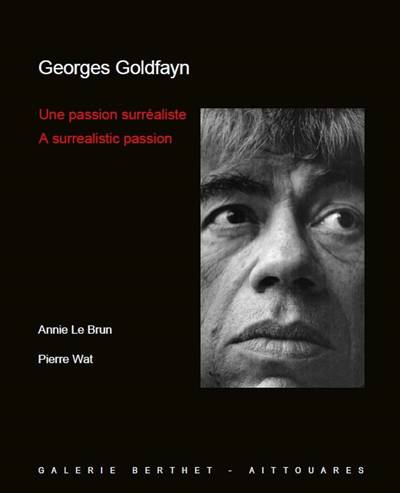
- Afhalen na 1 uur in een winkel met voorraad
- Gratis thuislevering in België vanaf € 30
- Ruim aanbod met 7 miljoen producten
- Afhalen na 1 uur in een winkel met voorraad
- Gratis thuislevering in België vanaf € 30
- Ruim aanbod met 7 miljoen producten
Omschrijving
Georges Goldfayn est né en 1933 à Paris. Membre du mouvement Surréaliste dès 1951, il a été écrivain et poète.
Pendant l'occupation, il se réfugie avec sa mère en Ariège. A son retour à Paris, il ne retrouve pas son père disparu entre temps en camp de concentration. Pour gagner sa vie, il travaille dans un des premiers bars de jazz parisiens, le Storyville.
Il rencontre André Breton en 1951 et devient son assistant à la Galerie A l'Etoile Scellée, que le poète et théoricien anime de 1952 à 1956. Georges est adopté par la famille surréaliste qu'il retrouve l'été chez Breton à Saint-Cirq-Lapopie en compagnie de Toyen, Heisler et Péret. Le cinéma tient également une place importante dans son activité. Dès 1951, il participe à la revue L'Age du cinéma, fondée par Robert Benayoun et Ado Kyrou. Plus tard, dans les années 60 il devient l'assistant d'Henri Langlois à la Cinémathèque française.
Ses positions politiques s'affirment dans la signature de textes surréalistes parus dans la revue anarchiste Le Libertaire de 1951 à 1952 ainsi que dans ses relations avec l'Internationale Lettriste. Après la rupture entre celle-ci et le groupe surréaliste, Goldfayn restera cependant en contact amical avec Guy Debord. Pendant la guerre d'Algérie, il signe le Manifeste des 121, texte soutenant le droit à l'insoumission et à la liberté du peuple Algérien en quête d'indépendance.
Quand le groupe Surréaliste est dissout en 1969, Georges Goldfayn participe en 1972 à la création des Editions Maintenant avec un collectif composé d'Annie Le Brun, Gérard Legrand, Toyen, Radovan Ivšić et Pierre Peuchmaurd.
Georges Goldfayn s'éteint à Paris en 2019.
Georges Goldfayn was born in 1933 in Paris. A member of the Surrealist movement as of 1951, Georges was both a writer and poet.
During the Nazi occupation, he took refuge with his mother in the Ariège Department in southern France. Upon returning to Paris, he would never again see his father, who in the meantime had been deported to a concentration camp. To make a living, Georges worked in one of Paris' first jazz clubs, the Storyville.
He met the poet and theoretician André Breton in 1951 and became his assistant at the gallery A l'Etoile Scellée, where Breton was a fixture from 1952 to 1956. Georges was adopted by the surrealist family that invited him on a summer holiday at Breton's home in Saint-Cirq-Lapopie, accompanied by Toyen, Heisler and Péret. His favorite pursuits also included cinema. He began contributing, as early as 1951, to the review The Age of Cinema, launched by Robert Benayoun and Ado Kyrou. Later on, in the 1960's, he held the post of Henri Langlois' assistant at the French Cinema Library.
His political positions were forged through co-authoring a number of surrealist manuscripts published in the anarchistic review Le Libertaire in 1951 and 1952, as well as through his relationships with the Internationale Lettriste literary society. After this society's split from the surrealist group, Goldfayn did however remain friends with Guy Debord. During the Algerian War, he signed the Manifesto of the 121, a letter supporting the resistance and freedom movement among the Algerian people in quest of their independence.
When the Surrealist group was dissolved in 1969, Georges Goldfayn went on in 1972 to participate in the founding of Editions Maintenant, alongside a collective composed of Annie Le Brun, Gérard Legrand, Toyen, Radovan Ivšić and Pierre Peuchmaurd.
Georges Goldfayn passed away in Paris in 2019.
Specificaties
Betrokkenen
- Auteur(s):
- Uitgeverij:
Inhoud
- Aantal bladzijden:
- 94
- Taal:
- Frans, Engels
Eigenschappen
- Productcode (EAN):
- 9782490315086
- Verschijningsdatum:
- 5/09/2024
- Uitvoering:
- Paperback
- Afmetingen:
- 220 mm x 270 mm

Alleen bij Standaard Boekhandel
Beoordelingen
We publiceren alleen reviews die voldoen aan de voorwaarden voor reviews. Bekijk onze voorwaarden voor reviews.











